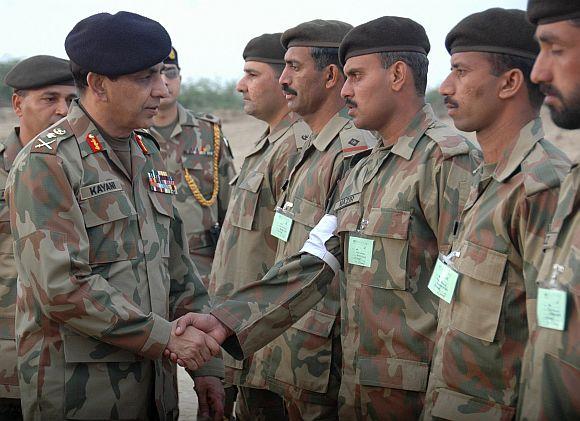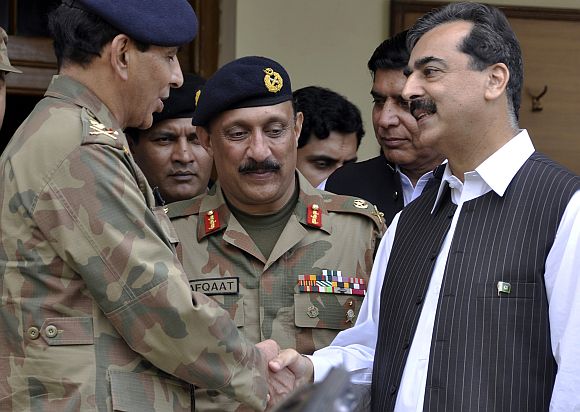Photographs: Reuters Aziz Haniffa in Washington, DC
Ex-CIA official Bruce Reidel had said in Washington, DC that amid speculation over Zardari's future, he believed that the 'creeping establishment' of Pakistan's fifth military dictatorship is underway right now, reports Aziz Haniffa.
Bruce Riedel, erstwhile Central Intelligence Agency veteran and a senior advisor to four United States presidents on Middle East and South Asian issues, has said he believes "we are seeing the creeping establishment of Pakistan's fifth military dictatorship underway right now," even as speculation is rife that Pakistan President Asif Ali Zardari, said to be recuperating from heart problems in a hospital in Dubai, is on the way out.
The author of the much acclaimed, Deadly Embrace: Pakistan, America and the Future of Global Jihad, who was a panelist at a conference on The Future of Pakistan at The Brookings Institution in Washington, DC, however noted, "It's not going to be a repeat of the Musharraf or the Zia era -- it's going to be something more subtle and more nuanced than that."
"But in many ways, it's another military dictatorship -- and a dictatorship means that there is a group in power that makes decisions irrelevant to what the popular vote, what the popular majority is and what the elected government is," he said. "And that's a phenomena we are increasingly seeing in today's Pakistan."
Please ...
'The new military dictatorship will be very different from its predecessor'
Image: File picture of Pakistan army chief Kayani meeting soldiers in an undisclosed location in that countryPhotographs: Reuters
Riedel, currently a Senior Fellow at Brookings, who at the request of US President Obama chaired the first interagency review of policy toward Afghanistan and Pakistan for the White House, referring to another panelist's notion of "the four-legged Pakistani political system," that has permeated that country's political fabric for the past three years, argued, "We are seeing a qualitative change in the power of those four legs underway today."
While acknowledging that "some will say this was always inevitable -- that the Zardari government because of the nature of who the president was, the nature of how it came to power -- was doomed to fail," Riedel argued "it's clear in retrospect than it was in 2008 or 2009."
"Some will also say Zardari's weakness -- and they are profound and they go to the very core of the politician that he is -- made all of this inevitable."
But Riedel said, this "is the benefit of 20/20 hindsight," and predicted that "the new military dictatorship that is emerging in Pakistan -- the fifth military dictatorship -- will be very different from its predecessor. The facade of civilian government is likely to continue to go on. We'll still have a president and a prime minister and there will be a foreign minister and they will also have the trappings of power."
However, in reality, he said, they would have very little of the real reins on power.
'Pak leaders scared to death of what the military can do'
Image: Pakistan prime minister Gilani with army chief KayaniPhotographs: Reuters
Riedel also predicted that "the media will continue to be very active and alive except when they criticise the army too seriously, at which point, the journalists who did so, will be terminated."
"The judiciary will be able to do what it wants to do, as long as it doesn't challenge the military. Behind the scenes, the army will decide the key issues -- of national security and allocations of resources."
Riedel conceded that "now here again, once can say this is not new in Pakistan and it's going on for a long time. But that was in some dispute over the last three years. There was an attempt by civilians to change that."
He said the civilian government "itself and many of its leaders -- and I would say this includes the president -- are increasingly intimidated and frankly scared to death of what the military can do."
Riedel said, "Memogate is the ultimate illustration of all this and is a phenomenon that is accelerating this process right as we speak. It's ironic, since the whole purpose of the memo in Memogate was to prevent a military dictatorship, is in fact facilitating the development of a military dictatorship."
'New elections could yet turn this around'
Image: File image of a woman casting her vote during the 2008 general polls in PakistanPhotographs: Reuters
Taking a major swipe at US-based Pakistani businessman Mansour Ijaz, the ex-CIA official said, "I hope that whoever wrote the memo and I hope that whoever wrote about the memo in the Financial Times, could live with their conscience about what they've done in the interests of self-promotion."
Riedel said, "The model that Pakistan is becoming unfortunately, is a South Asian version of Algeria, where the military rules behind the scenes -- it's very hard to even know who in the military is ruling behind the scenes."
He said, "It's an assembly of generals who make decisions behind curtains, behind false fronts all the time. Not a single powerful person but a collection of them. In the case of Pakistan, it's of course, the core commanders."
However, Riedel said, "The good news is that I don't think this process is irrevocable yet -- it can still be turned around. Pakistanis if they want to, can prevent this from happening. New elections that produce a strong mandate for a new government could yet turn this around. It is no guarantee by any means, but it's certainly a possibility."
But, he reiterated that "left on a steady drift that it is -- I see Pakistan going into its fifth military dictatorship."





article